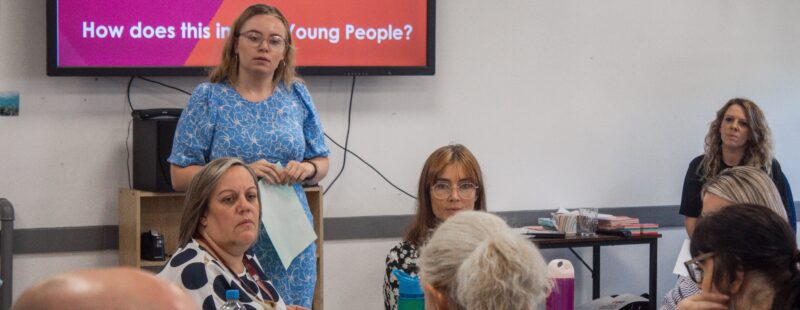We spoke with Molly Taylor about the experiences of loneliness among young people and what inspired her to set up Alone No More.
Can you tell us a little about yourself?
I’m Molly Taylor, a passionate activist dedicated to combatting youth loneliness both locally and nationally over the past couple of years. My journey into this cause began when I, at the age of 21, faced the stark reality of loneliness for the very first time. However, this solitude evolved into a chronic condition that took over my life, becoming a detriment to my overall well-being. From eating alone to days without contact with any friend, loneliness took over my life. This downward spiral led to a severe mental health crisis, where support seemed out of reach and hard to find.
During those challenging days, I reached out to national helplines in search of support, yet often faced discouragingly long waits or dismissive responses. Advisors frequently mistook my symptoms for depression or anxiety, inadvertently steering me away from the specialised support I truly needed.
My perspective shifted when I encountered the Belong Collective at UK Youth. This network, centred building a cross-sector network and youth advisory board addressing loneliness, illuminated the fact that I wasn’t alone in this struggle. Suddenly, my personal journey with loneliness had significance and I felt heard and seen. This was also my first time ever accessing youth work, an experience that not only restored my autonomy but also empowered me to be an agent of change.
Since then, along with fellow Belong Collective members, our impact has been remarkable. From hosting webinars during Loneliness Awareness Week to shaping loneliness research through the “We Choose to Be Here” report in 2022, collaborating on workshops with Youth Focus NE, influencing national policy discussions through parliamentary involvement at an APPG with Stuart Andrew MP, minister for loneliness, and even being featured on BBC politics – we’ve been at the forefront of change.
What was your inspiration behind setting up Alone No More?
My inspiration to establish Alone No More, an initiative dedicated to ensuring no young person faces loneliness alone, comes from my own lived experience. Interacting with other young people daily through my activism revealed that everyone has felt lonely at some point in their life. While current estimates suggest around 2 million young people experience loneliness, I’m convinced this figure is an understatement. It’s clear that sharing our stories and experiences is crucial in recognising the symptoms and bridging the resource gap. The lack of accessible and well-defined resources further underscores the urgency, driving me to create a hub for young individuals and organisations alike to collaborate in addressing loneliness.
How can young people who might be feeling lonely get involved in Alone No More?
The avenues to participate in Alone No More are diverse. From reading blogs sharing personal experiences (with plans to feature submissions from young people), accessing resources like the Youth Focus NE Connected Communities colouring book or Co-op Foundation’s “Lonely Not Alone” universe, to engaging in a moderated forum called the Solace Community – where open dialogues about loneliness thrive. The upcoming Activist Academy, a hub of free courses, will empower young activists to initiate change across various domains, including loneliness and other social justice issues.
How can organisations support Alone No More?
Organisations play a pivotal role in the success of Alone No More. By partnering to distribute loneliness postcards within their networks, they directly reach young people in need. These postcards serve as a loneliness resource, and show young people that support is available. In return, we request feedback and photos of how the postcards are being used. In just two weeks since our launch, we’ve partnered with seven organizations, collectively reaching the lives of over 6,000 young individuals. Your support – whether through postcard distribution, funding for resources and workshops, or simply amplifying our mission on social media – makes a meaningful difference.
What would you like to see happen next for Alone No More and the movement against youth loneliness more generally?
I envision Alone No More evolving into a Community Interest Company, allowing us to implement tangible solutions for the 2 million young people battling loneliness. Beyond that, my aspirations for the broader movement against youth loneliness involve fostering cross-collaboration and instead of working in silo, working together. I also hope that one day there is also a targeted helpline specifically for loneliness, so that young people find the support they deserve. I addressed this in the APPG and on BBC politics feature, which you can see if you click the link.
Join us, and let’s shape a future where no young person experiences loneliness alone. If you are interested in partnering or supporting Alone No More contact: iwill.molly@gmail.com





No comments on this article yet. Please feel free to submit a comment below.
By submitting a comment you grant Campaign to End Loneliness a perpetual license to reproduce your words and name/web site in attribution. Inappropriate and irrelevant comments will be removed at an admin's discretion. Your email is used for verification purposes only, it will never be shared.